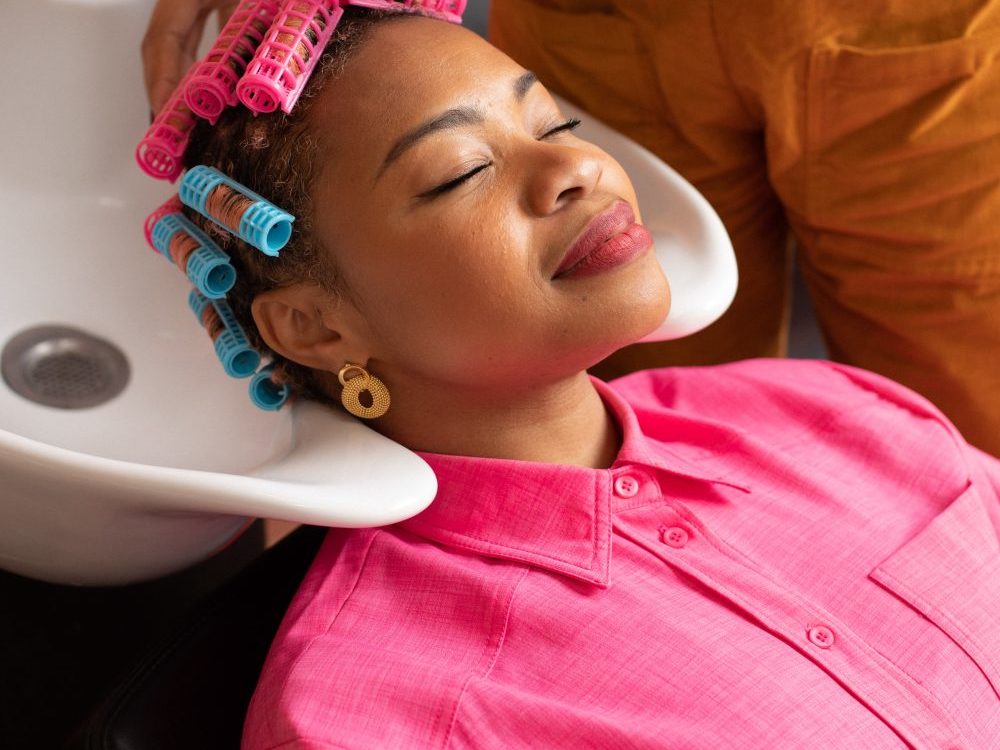Winnie Awa is the co-founder of Antidote Street, an online platform that curates the best hair care for afro and curly textured hair.
I meet Winnie in Kilburn at SIMPLYGorgeous, one of the salons involved in the Antidote Street Salon Manifesto. As we open the door (photographer Izzie and I), Winnie is standing in a long, cream, A-line skirt with a pink shirt and rollers in her hair.
Her smile fills the room. Her PR Manager, Deborah, smiles as well from behind the desk and offers us tea. I say yes, of course, whilst Izzie starts taking a few photos. But the light isn’t right yet. We sit down to chat instead. “I started it because it was such a challenge to get access to high-quality products that are safe to use,” Winnie tells me. “I’m not sure if you’ve seen articles about how products that are targeted at women of colour or women with textured hair disproportionately have chemicals that can harm us in them?”
I have.
Upsettingly, research shows many afro hair products do not list their full ingredients and test positive for hormone-disrupting substances.

“When you look at the FDA (Food and Drug Administration) in America in comparison to the cosmetic regulations here in the UK,” Winnie explains, “the FDA bans about 30 ingredients and the EU bans 1300. Historically, we never really had products targeting textured hair originating from Europe so it’s often imported into here through some crazy back channel from America. You end up with a scenario whereby people can put whatever they want in the ingredients.”
I ask how Antidote Street combats this. “We basically take the philosophy of curating the products on our site which means thinking about what is good for our customers’ health and about providing people with the knowledge that will help them live their best life,” Winnie says, smiling. “Essentially we want [customers] to feel empowered by using something that is relevant for their hair texture. We also provide one-to-one advice, enabling Antidote Street to be a personalised destination that matches people with the right products for them.”
If you scroll through Antidote Street, one of the strongest messages conveyed is its need to give its customers access to the best brands, valuable hair education, beautiful user experience and excellent customer service. I ask Winnie about her personal experience of the hair care industry and what triggered her focus on these factors.
“You can’t just go to Space NK, right?” she says, explaining the lack of resources in mainstream outlets.
“You have to go to shops that are further from where you would go ordinarily. Peckham, for instance, has these big stores with products stacked from top to bottom. You go in there and no one can give you any advice and there’s limited Due Diligence around whether products are real, fake or EU-cosmetically tested. The experience has always been wanting.”
We move on to talking about natural hair – Winnie’s to begin with, which is short, pink and curly. She tells me that she was 29 when she first went natural. “I didn’t have a big philosophical reason,” she says, laughing when I ask what prompted the change. “I just wanted to see what it would look like. A lot of my friends were going natural and I was just kind of like, ok, let me just give it a try.
I started braiding my hair and after the fourth round, this curly thing just emerged. I’d never experienced it that way. But do you know what’s really fascinating? My sisters, when they saw it, were like, Dude, are you our sister? This is very different from what we have.
When I think about it in those terms, it’s pretty strange that I didn’t know [how my hair was naturally] well into adult life.
How the hell could I have had a chance of actually figuring out how to look after it? I remember you’d go on holiday and if you forgot your hair care products, you could guarantee that whatever serum you found in the pharmacy wouldn’t work. I’m sure you’ve been there at some point in your life?”
I have.
“So when you ask about my experience, it’s a mix of the lack of and inadequacy. We don’t have time to spend all our hours on YouTube, watching stuff that may or may not help you. That’s what we wanted to tackle with Antidote Street.”
The Antidote Street Instagram account is populated with products, women with beautiful afro hair and more. They also focus on myth-busting, bringing in experts to debunk long-held myths from within the community.
“Oiling the scalp is something that you shouldn’t do,” Winnie tells me (to my horror – it’s something I’ve long sworn by). “Your scalp creates sebum which is a natural oil anyway so we don’t need to add it.” There is also a post on hair pills. “People always talk about biotin but we’ve got biotin in stuff that we’re already consuming,” Winnie says. “If anything, people of colour should be using vitamin D all year round. It’s just things like that, having access to proper knowledge, that can help you to make clear, conscious choices about your hair routine.”

Next, I ask Winnie about her experience of her hair in Nigeria (where she lived until she was 17) versus when she moved to London. “I didn’t feel bad about my hair. It was just my hair. But I did want to straighten it. The reason why I wanted to straighten it was because that’s what big girls did.
My sisters would get to a particular age and they would straighten their hair – maybe not a weave but it would be relaxed. My hair was relaxed fairly early on. I think they first did a hot comb and then relaxed it when I was like four or five.”
She then explains how her hair was received after first going natural. “I think my family thought that it was just going to be a phase. It wasn’t like a big massive issue but I don’t think that my mum understood; there is a belief in Nigeria that hair needs to be perfectly pulled back into a style which typically means straightening, plaiting or a weave. But now, a lot of my siblings have started going natural and my nieces as well, which is pretty cool.”
I ask Winnie about her hair routine. She smiles. “Now that it’s coloured, essentially I’ve F’d (can I say that?) my hair follicle. When you colour your hair, your follicles become raised and that’s what typically leads to breakage, dryness and frizziness. Because of that, I now have made deep conditioning my BFF.
Literally every week I wash and deep condition my hair with my heated deep conditioning cap. That’s a non-negotiable. I also pay attention to the protein/moisture balance by varying between moisturising conditioner and products with a bit of protein. That strengthens my hair, making it resilient whilst giving it the moisture it needs.”
One of the factors that has made caring for afro hair care prohibitive in the UK is the lack of access to training in it. From my own experience, I’ve often been charged extra to have my hair cut almost, as Winnie says as if a tax is levied on the texture.
“I think that it’s particularly fascinating that hairdressing schools don’t mandate that professionals train in afro/curly hair. They have to actively seek out the module. In some, you even have to pay extra to learn it. It’s no wonder that the 35,000 salons in the UK have scenarios where people are not able to cater to this texture of hair – and I actually don’t blame the salons.
If you didn’t learn it, how are you going to recruit talent when it comes to the pipeline? I think that that’s essentially what’s causing the imbalance.”

Antidote Street pledges a five-point manifesto. I am interested in why Winnie felt that it was important to include these pledges within the core of her business. “I remember someone saying something like finding a good salon is like the holy grail,” she explains. “Antidote Street is in the business of creating really good experiences where there haven’t been any. We held a symposium early last year with industry professionals who compared the industry when they started out with the industry today. Off the back of that, they discussed what good looked like and what was and wasn’t acceptable. What we boiled down from these discussions became the manifesto.”
One of the manifesto points that really resonates with my experience is about time. “Timeliness is a massive issue,” Winnie nods. “I think it’s a dual-issue where people come late for their appointments or they cancel their appointments without telling the stylist. That causes a knock-on effect and it’s something that everyone in the room packed up about.”
Do you think that the tide is changing in terms of the attitude towards textured hair at salons, I ask? “I’m actually quite positive about where the industry is going as a whole,” Winnie agrees. “To have a conversation like the manifesto is so positive, and I’m a big believer in if something doesn’t work, change it.
Don’t wait for someone else to do it. That’s definitely the philosophy that led to creating Antidote Street.” She adds, “I looked recently through my old Vogue magazines and I’m amazed that in my early twenties, I was really ferociously reading this stuff but actually I couldn’t see any part of myself in it. I think that attitudes are definitely changing but I’d love to see even more of that happening.”
I ask what role appropriation plays in the progress of the industry and whether figures like the Kardashians (who flaunt braids, cornrow, dreadlocks etc.) should be in any way attributed? The question is controversial.
“That’s a very difficult one because people have been wearing those styles for forever,” Winnie says, shaking her head. “When I look back at the natural hair movement, it happened for a whole host of reasons. Sometimes it was because women wanted to be liberated, sometimes they wanted to feel like themselves. The off-shoot from doing that and seeing so many women looking bloody fantastic has been so empowering, right? I think this momentum is what propelled it forward.”
Finally, we speak about Winnie’s plans for 2020

“Oh my gosh,” she exclaims. “Lots!” She leans back in her char. “So, last year, we did the pop-up Hair Lab. We brought onboard trichologists and hair stylists to deliver hair care recommendations and help people figure out the right products that they should be using.
We popped up in Covent Garden, Brixton, Spitalfields and Russell Square. This year we’re going to be taking that to the regions which is super-exciting! We’re also partnering with a number of brands to support Antidote Street Labs.
We also just launched Amara, a silk pillowcase. It’s 100% mulberry silk and it basically makes it amazing to sleep in.” Winnie hands me a tube in which the pillowcase is wrapped. The silk is so soft I could cry. “The reason we launched it is because cotton is really drying for the hair and we wanted to create something that would make it easy for people to go to bed without worrying about twisting or wrapping their hair. Now they can wake up without their hair being stripped of its moisture.”
I hand back the pillowcase and ask if there’s anymore Winnie wants to talk about. She has a think, looks at Deborah and finishes with, “And there are more exciting accessories to come!”
Words by Gemma Doswell, Images by Izzie Hardy.









